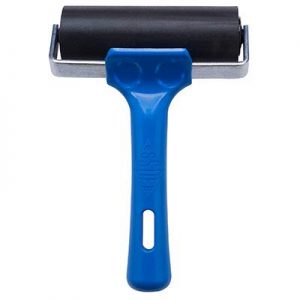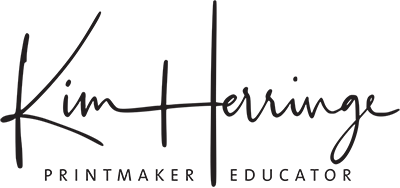Printmaking Workshop Expenses and Materials Costs
Running workshops, art workshops or other, are a heap of fun, plus some hard work. I love to share my printmaking skills and studio space.
Planning my workshop program is pretty straight forward, but costing a workshop adds an administration dimension that, as an artist (albeit one with a bit of a business head), wasn’t so straight forward; and once done, proved to be a very enlightening exercise.
Workshop pricing is determined by two factors
The Tuition Fee
When working out the tuition cost and materials fee for my workshops, I realised there was a lot to consider … teaching time, program and handout preparation time, venue costs, catering, promotion and advertising, preparation and cleanup and of course the materials used during the workshop.
Time
For every workshop, be it a single day or weekend workshop, and even private tuition, time is the largest resource investment. There is the time needed to actually teach a class, but there is also almost as many hours in preparation, promotion and administration of each workshop.
- Coordinate student enrollment
- Check and collate materials
- Venue setup
- The workshop itself
- Venue clean and tidy up
- Tools cleanup and packing
Add to that the hours of preparation, planning and development that go in to each and every workshop to ensure the best quality delivery of content and workshop experience that I can possibly deliver.
PLUS there is also the time to create and distribute promotional and advertising material, including printing flyers, newspaper and magazine advertising, social media posts and promotions and email newsletters. Oh and the website … that is one task that seems to never end – maintenance and updates on my website.
Venue and Catering
My workshops are run from my personal studio. With that is the need to cover the costs associated with workshop furniture, resources and utilities (internet, water and electricity).
I love to have a cuppa on hand while I’m working, so I assume that other printmaking enthusiasts feel the same. I provide tea, coffee, hot chocolate and a light morning and afternoon tea (biscuits and/or cake) with each workshop.
The Materials Fee
All materials are provided for every workshop.
That means you don’t have to buy anything prior to any workshop and I know you will have everything you need to complete each workshop. You will leave each workshop with a list of materials and supplies to source if you wish to continue at home, including a list of what I buy from which online or in-person art supply store.
During each workshop I talk through pricing options for different supplies and materials, catering to a range of budgets. That way you can decide what you want or need to buy, and from where.
 My attitude in life is to buy the best quality resources that you can afford at the time. I believe this to be especially true when it comes to buying art materials. Over many years in my own printmaking practice I have afforded myself a collection of quality tools, all of which I treasure (you can read about my favourite printmaking tools here).
My attitude in life is to buy the best quality resources that you can afford at the time. I believe this to be especially true when it comes to buying art materials. Over many years in my own printmaking practice I have afforded myself a collection of quality tools, all of which I treasure (you can read about my favourite printmaking tools here).
When it comes to tools used in my workshops, I maintain a similar approach. Given the volume and multiples of items needed to run the workshops, I have purchased mid-range quality tools and resources. We print with quality printmaking papers and there is a collection of other good quality tools and resources we use during each workshop.
All the necessary materials for all workshops are covered in the Materials Fee of each workshop. I do this so people can learn a new process without having to buy everything first. That way they can explore to see if they like the process before investing in tools and equipment. During each workshop we talk about the tools and resources needed. I share what I buy what, and different prices points for different budgets.
Different workshops require different materials, but all materials are quality, and wherever possible, ‘artist quality’:
- handouts and fact sheets
- reference images for print inspiration
- tracing paper to transfer images
- pencils, erasers, pencil sharpeners, permanent markers, rulers, scissors, cutting knives, sticky tape
- lino block for carving and printing
- lino strips for practise mark-making
- different mark-making tools and resources
- aluminium metal plates
- brayers (aka rollers)
- barens, several different types
- quality printmaking paper
- cartridge paper
- fabric swatches and silks
- printmaking inks
- artist quality paints
- carving tools
- etching tools
- palette knives for preparing and mixing ink
- glass for ink mixing and rolling
- wipes and rags
- paper soaking and washing trays
- newspaper
- pre-made registration boards
- materials for making registration boards
- foraged plant materials
- cleaning and clean up materials and resources
- different chemicals for different processes
- gloves and safety equipment where needed
- gas cookers and boiling pots
- brushes for cleanup
- reference books, magazines and literature
- and a collection of purchase prints by other artists to share with you as examples of different styles and approaches to the medium you are learning
- the list goes on but I’ll stop here, but I hope you get the idea.
In Summary
Talking money and costs can get a little awkward, but I hope this article helps with a breakdown of the costs associated with my workshops.
If at any time you have questions or want more information, please contact me directly. I am happy to answer any questions you may still have.
Ready to join a workshop?
Have a look through my workshop program here:
- Workshop Overview
- Gelatin Plate Monoprinting
- Gelatin Plate Monoprinting Beyond the Basics
- Note to Self – Gel plate Monoprinted Postcards
- Linoprinting 101
- Reduction Linocut
- Eco-printing on Paper and Silk
- Cyanotype
- Aluminium Metal Plate Etching
- Simply Folded Artist Books
- Private Tuition
- Printmaking Workshop Gift Vouchers




